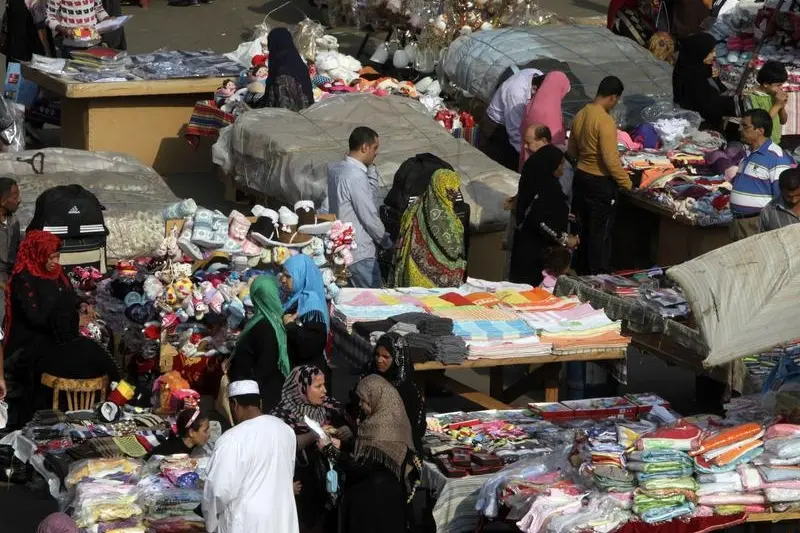PHOTO
By Yasmine Saleh
Egyptians are not very happy at the moment. From university students about to start their working lives, to small business owners struggling to survive, many among the Arab world’s largest population are angry at the price hikes that have hit most commodities in the country and they have no qualms about letting the government know about it.
“Someone go tell the Egyptian government that a bag of salt still costs the same, maybe they forgot to raise its price,” an Egyptian woman wrote on Facebook a few weeks after the government announced a cut in energy subsides that increased fuel prices by 35 to 46 percent.
The government’s announcement coincided with a decision by the central bank to float the Egyptian pound. The currency’s value against the dollar surged to 13 pounds, a rise of nearly 50 percent. The policy was designed to eradicate the black market and push through economic reforms, crucial to secure a three-year $12 billion loan from the International Monetary Fund, urgently needed to cover the state’s widening budget deficit.
Reaction to the recent economic moves spurred the President of the American University in Cairo (AUC), the state’s most expensive education establishment, to issue a letter aimed at calming students and employees anxious about the impact of the currency flotation.
“I have announced our commitment to ensuring that no student is forced to leave AUC as a result of an inability to pay tuition, and that remains a top priority. In addition, we simply must find ways to help our lowest-paid employees who will be hardest hit by the anticipated increase in inflation,” Francis J. Ricciardone, AUC President, wrote in a letter that was shared by the university’s students and alumni on social media.
He later announced the allocation of $1 million to help struggling students to continue the current academic year.
Annual inflation rose above 14 percent in October, according to the Central Agency for Public Mobilization and Statistics. Egypt’s finance minister has said that the economic programme agreed with the IMF aims to reduce inflation rates to less than 10 percent by 2018/2019.
“Everything went up by 30 percent (in the last few weeks). What used to cost 100 pounds now costs 130,” Ismail Mahmoud, an employee in a private Egyptian firm, told Zawya. “The price of electricity had also gone up. Some people who used to pay one or two thousand pounds per month for their electricity bills, now could pay 6,000 pounds a month.”
The surge of prices has also hit hard the medical sector, leading to the disappearance of some expensive, imported medical drugs. “There is no mercy, how come the prices of drugs go up four times, how would you escape God’s punishment on such thing?” an Egyptian going under the name ROTO tweeted.
Painful cure
The economy of Egypt has been badly hit by a wave of political turmoil that followed the ousting of President Hosni Mubarak in a popular uprising in 2011. The state’s strategic stock of foreign reserves plunged to $19.041 billion in October 2016, from about $36 billion built up before the 2011 uprising.
“We import about 70 to 73 percent of our needs so it is normal to witness a further hike in prices after a floatation decision,” said economist and parliament member Bassant Fahmy. “But the decision, although was tough, was the right move and it will have a very positive impact on the economy on the long term.”
“We have economic problems of over 60 years old and we are only now starting to fix them,” Fahmy said, referring to Egypt’s decades-old budget deficits that have been bloated by heavy spending on subsidies and salaries for around six million state employees.
Egyptian President Abdel Fattah Al Sisi, who came to power in 2013, had said it will not be an easy or quick job to restore economic and political stability to the country of 90 million people. Prime Minister Sherif Ismail said on the day after the floatation decision that Egypt "no longer has the luxury" of postponing difficult economic decisions.
Ezzat Abdallah, professor of economics at Thebes Academy, a Cairo-based private university, expects inflation to hinder the short-term flow of new investments to the country. “Investors examine a country's basic inflation rate and ways of confronting it before they pump their money," he said.
“Stop whining”
Some Egyptians have urged their fellow citizens on social media to be more optimistic about the future.
“I know it's frustrating but we have to man up, stop whining, be supportive and wait till things get better coz inshallah (by God’s will) they will,” Zeinab Mostafa, an Egyptian businesswoman and owner of Devour, a prominent chain of cupcakes stores, wrote on her Facebook page.
Mostafa shared a list of prices for the raw materials she uses daily, which showed an increase in the price of 25 kilograms of butter to 1,600 pounds in November from 860 pounds four months ago, while the price of 1 kg of sugar rose to 16 pounds from 4.25 pounds.
Egypt last month witnessed a sugar crisis when a shortage in the vital commodity led the government to raid grocery stores and big companies to capture their stocks of sugar. It had briefly seized 2,000 tonnes from sweet maker Edita, one of the largest listed companies on the Egyptian stock exchange.
Many Egyptians remain worried about their future. Several have contacted their friends who live and work abroad asking for help to get a job. “I am working to get out of here, anywhere in the GCC (Gulf Cooperation Council) or Europe, anywhere out of here,” said one Egyptian employee, who asked not to be named.
(Additional reporting by Mohamed El Agami and Marwa Abul Magud in Cairo, Editing by Shane McGinley and Ghaida Ghantous)
© Zawya 2016





















